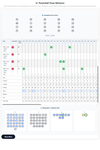In the last few years, the prices of products and services have been constantly rising worldwide, which affects each of us, wherever we are on the planet. This is why saving is more critical today than ever. One option is thrift shopping, which can significantly help you save monthly and annually. To start your savings journey, you must adequately assess your budget and understand your finances to achieve savings.
1. Create a budget
When you decide to start, the first month should be a test month so that you can gather all the necessary data to start saving, which can then benefit you gradually. This will help you create a budget. Expenses can be constant, such as those costs from which "we cannot escape," like bills, so it's best to separate them from those non-essentials.
Ensure you enter your budget into a spreadsheet like Excel, Google Sheets, or any other online free program.
Your spreadsheet should be divided into four categories based on your outgoings: bills, rent, transport expenses, and food. Of course, if you have additional items you would like to include in the tracking table, then do so.
Certified financial planner Teresa Nicholas recommends using the 50:30:20 rule. This rule says it is best to allocate half of your earnings to unavoidable expenses, 20% to savings, and 30% to whatever you want. Plus, if you have debts, you must settle all debts before you start saving.
2. Plan your spending habits
Budgeting or planning spending is one of the oldest tricks for saving. This is a powerful weapon if you need to save money in the short term. There are three critical factors for successful budgeting: planning for rational and realistic money allocation to each area defined in the budget, a periodic review of this plan, and checking if it really "works" each month.
This is the best thing you can do regarding your monthly expenses.
3. Buy groceries on sale
Although not all sales in stores are actual sales, it is still recommended that you choose and buy everyday products, groceries, household chemicals, and cosmetics when they are on sale at a non-food chain. Large markets offer better deals than small markets due to competition and provide cheaper brands that you can choose. Inflation, which has been following us for a while now, affects food products the most, whose prices rise several times yearly. Therefore, a piece of good advice is to buy food products during discount sales and reduced sections, buy more multipack items, and buy supermarket brands from a specific chain instead of well-known, "traditional" brands. Try to prepare food at home that is cheaper and healthier.
4. Use more cash
This can sound strange these days because most people use cards primarily. Research has shown that this gives consumers a different feeling of spending money. When we pay with a card, we have a more significant impression that we are not spending money than when we pay with cash.
Therefore, it may be a better option to use cash during purchases, where possible, to get a clearer picture of your spending.
5. Go thrift shopping
Thrift shopping can save you a lot of money and alter your financial situation. However, searching for quality used products can be challenging, as many unusable items are often advertised. Therefore, it's crucial to follow reliable websites. Such sites can help you avoid wasting too much time finding quality products.
When deciding to purchase items such as electronics, something for a hobby, or an item you need for your children, which they quickly outgrow and do not use much, reach for sites like Locanto first and check out their thrift shopping section so you can significantly save and contribute even more to your household budget.
6. Be mindful of food preparation
Food preparation takes little time, but you can save significant amounts daily if you choose the right foods and only what you need. Impulsive buying of unnecessary food is one of the leading causes of food spoilage and food waste. Before going shopping:
- Make a list of the groceries you need.
- Take a moment to assess your fridge before you shop. If planning a large purchase, consider avoiding many easily perishable products and leaving them for everyday purchases. This simple mindfulness can make a big difference in reducing food waste. Check the expiration date on the foods you buy to avoid accidentally purchasing something that is only edible for a few days or less.
7. Cancel unused subscriptions
Cancel all subscriptions you do not use, whether online or magazine subscriptions you no longer enjoy, or subscriptions for movies, music, and other things you may not have time to use.
To save money, you must first be debt-free, live by your income, or start working an additional job to increase your income. Monitor your budget from month to month and eliminate all unnecessary expenses you may have. Use all available options, like thrift shopping, to avoid unnecessarily high spending. At the end of the month, you will see the difference, which will be apparent, and you will sail into a safe harbor of secure finances.
8. Reduce your utility bills
Try to reduce utility bills as they are a significant item in the budget that is necessary from month to month. Utility bills are there, and we have to pay them, but we can reduce those bills to a minimum. For example, there are many ways to reduce your electricity usage. This includes replacing regular light bulbs with LED bulbs and monitoring your use of big household appliances like televisions
@[email protected] this article is now proofread and can go to publisher
Original Source of the original story >> Eight Tips on How To Start Saving Money






